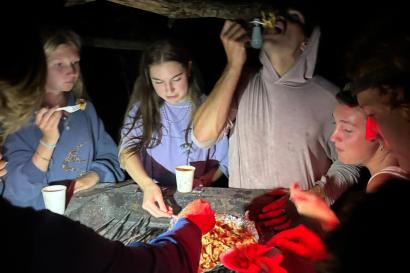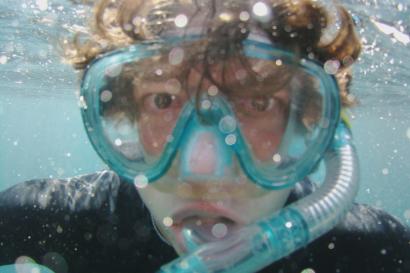Study abroad prep can be daunting – between organizing flight itineraries, transfer credits, finances, housing, vaccines, there’s a gazillion things to keep track of.
Throw accessibility needs into the mix, and this process can easily get overwhelming. I’ve made a list of 5 ways I am preparing to study abroad as an autistic student.
Hopefully, some of these tips can help make your preparation process a little easier:
1. Make a List of Your Accessibility Needs
Sit down and list out all your accessibility needs. Even the random, ultra-specific ones. For example, my list includes regular breaks from work/school, access to a quiet place to decompress, and ear protection.
2. Organizing Accommodations
Look at the list you just made, and think about how you can accommodate each of these needs while abroad.
Whatever formal accommodations you have at your home university, see if you can get equivalent accommodations from your host school while abroad. Even if you don’t think you’ll need them, I recommend setting them up anyway. Living abroad can be a big adjustment, and it’ll be good to have those accommodations available in case you do need them.
Remember to organize self-accommodations too! I was diagnosed too recently to get official accommodations with my home university (and therefore the university at my study abroad location), so I’m relying solely on self-accommodations for my semester abroad. For me, these include:
- Taking a lighter course load so I have more down time to recoup
- Carrying headphones, earplugs, and sunglasses at all times
- Wearing sensory-friendly clothing
- Bringing stim toys and aromatherapy stuff
- Wearing a sunflower lanyard at airport security and customs
- Bringing a supply of snacks that are “safe foods”
Of course, your accessibility needs will differ from mine, so it’s important to use the self-accommodations that work for you. If you use communication cards, bring them, and perhaps bring another deck in your destination’s local language. If you usually sleep with a weighted blanket, see if you can tetris it into your luggage, or purchase one while abroad.
Additionally, you can contact the IES Abroad student coordinator for your destination to discuss housing options while abroad. I had a Zoom meeting with the coordinator for my city, where I explained how my autistic traits impact my housing needs. The coordinator then used this information to match me to my host family.
3. Make Plans for Airports
Airports are notoriously loud, confusing, and overwhelming. Here are the ways I’m planning to mitigate this:
- Printing out airport maps so I can be familiar with their layouts
- Wearing construction headphones. Regular noise canceling headphones don’t cut it for me in busy airports. Instead, I wear “heavy duty” construction headphones that are rated for 25 dB. As a bonus, they have Bluetooth (so I can still binge JetLag: The Game while I wait for my flight!). They are a little pricey (around $60 USD), but for me they’re worth every penny!
- Wearing a sunflower lanyard at airport security and customs. Lots of airports know about the sunflower lanyard, so it gives me some peace of mind that my communication differences are less likely to be interpreted as “suspicious” by security personnel.
Additionally, many airports offer free accessibility services. Offerings differ from airport to airport, but an example would be having an airport employee guide you through security to your gate. However, these services are usually only available if you request them ahead of time. So if you’re planning on using them, be sure to call the airport in advance to arrange for it.
4. Plan for Medical Emergencies
It’s important to have a plan set up in case you are incapacitated during a medical emergency. Make sure your study abroad program has your medical history and up-to-date contact info from your emergency contacts.
I also recommend carrying some form of medical ID (such as a bracelet or ID card) to inform medical personnel that you are autistic, since autistic people often have adverse or paradoxical reactions to certain medications. Additionally, you may also have a comorbid condition you’d want doctors to be aware of.
I opted for a medical bracelet, since it’s easily visible and accessible by medical personnel. The outside of the bracelet just has the caduceus symbol; my information is only visible if you take off the bracelet and flip it inside out. The bracelet lists my blood type, allergies, and says that I’m autistic and have sensory issues. As a little extra guidance for medical personnel, I included the instruction to “speak calmly and clearly.”
If you want to convey more information than can fit on a medical bracelet, or do not like to wear bracelets, a medical ID card is another option. If you’re traveling to a country that recognizes the hidden disability sunflower, you may want to purchase your card from the Hidden Disabilities store. Otherwise, some police departments offer free medical ID cards, or you can buy custom ones online.
If you experience situational mutism or verbal shutdowns in stressful situations, it might also be a good idea to carry communication cards so you can more easily interact with medical personnel.
5. Ask Lots of Questions!
The more you know ahead of time, the less room there will be for anxiety. So, whenever I think of a question about my study abroad program, no matter how random or trivial, I write it down. Then, when I have a sizable list of questions, I call my program advisor at IES Abroad to answer them.
This is super helpful because I can quickly get a better understanding of how things will work when I’m abroad. You can also email your advisor, if phone calls aren’t your jam. Either way, I definitely recommend doing this in the months leading up to your study abroad trip.
***
Studying abroad is certainly exciting, but it can get overwhelming to think about. I hope this list gave you some ideas for how to accommodate yourself while abroad, and made the preparation process a little less daunting.

Teagan Serink
Salutations! My name is Teagan Serink. I’m a junior at the University of North Texas, where I’m studying music, technical communication, and Spanish. I enjoy singing, birdwatching, and herping. This summer, I’ll be studying ecology in Quito, Ecuador!







